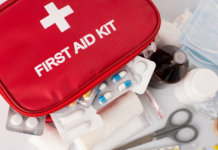In 2014, the last of the Baby Boom Generation hit the half-century mark. These are your golden years, so prioritize your health and wellness by following these 5 simple steps (no exercise required—at least not yet)…
Get a good night’s sleep—no matter what!
We highly recommend you focus on sleeping consistently. Studies have show that lack of adequate sleep increases your risk for cognitive decline. Worse, lack of sleep makes it harder to maintain a healthy weight. And, as we know, weight is a contributing factor of Type 2 diabetes. This increased weight makes you more likely to feel depressed. And it raises your chance of heart attack, stroke and you’ll have more difficulty coping with back pain and arthritis.
Good news! Changes to your diet will contribute to an easier bedtime routine.
Make your diet vitamin-friendly.
There’s ongoing recent debate about taking multiple vitamins and supplements. But there’s no debate about getting nutrition from food sources—Calcium increases bone mass and healthy blood pressure (drink your milk!)—Magnesium adds muscle mass and regulates your heart rate (we recommend meals including fish or dark leafy greens or nuts and seeds)—Omega-3 fatty acids maintain brain function and reduce the risk of heart disease (there’s 500-1,000 mg in a small can of tuna).
Set aside time to speak with a nutritionist.A healthy diet with the right nutrients can contribute to healthy rest, which will help keep your weight under control.
Skip the dangerous foods.
First off, slash your salt intake to reduce blood pressure. Seriously, you can ditch the saltshaker (trust us, there’s plenty of sodium already included in prepackaged foods). Also, do your best to avoid the freezer aisle at your grocery store (ever wonder how food is so well preserved? Yep, it involved high amounts of sodium).
And, if you want to take even stronger action, drop diet soft drinks altogether. A recent study found they might be linked to a higher incidence of heart attack or stroke. Skip the cold cut meats, too. They’re laced with nitrites and nitrates that are known to elevate colorectal cancer risk by up to 36 percent. And listen to the advice of fifty-something diet expert Maureen Callahan when she says, “[Cool Whip is] a mix of unhealthy hydrogenated oils, high fructose corn syrup and enough chemical additives to make you squirm.” Not sure about you, but we’re going to keep that out of our fridge.
A smart diet is the best defense against the risks of heart disease, hypertension, stroke and other chronic conditions.
Ask For More Than A “Routine” Checkup.
We hope you’ve stayed on top of your cholesterol levels, and blood pressure and even your body mass index (BMI). But there are additional tests you probably skipped over in your yesteryears: Have you had a head-to-toe skin exam recently? This will help you avoid skin cancer. Experts also recommend that you get tested for Hepatitis C (it’s a simple blood test). Did you know? Boomers are five times more likely to contract the disease. And get tested for sexually transmitted diseases and vitamin B12 deficiency (if you’re vegetarian, this will put you at a much higher risk for anemia and dementia).
Work with your healthcare providers and request comprehensive examinations. The benefits of avoiding a health problem are more advantageous than ever.
Men, quit procrastinating—check your prostates!
The second-leading cause of cancer death in men is prostate: 1 in 38 men between 40 and 60 years old will be diagnosed with the condition, 1 in 15 between 60 and 70. But even in light of these numbers, men are still surprisingly lax in getting checked up. Even amidst debates about the test’s reliability, a PSA test is the first step in the diagnostic process.
There’s nothing more manly than living a long and healthy life. Make time for a PSA.
Mark Twain joked “Age is an issue of mind over matter. If you don’t mind, it doesn’t matter.” But jokes are only funny because they’re half true. You and your health totally matter. So put mind over matter and make your health your prerogative. Eat smart, get a good night’s rest and ask for more than just routine checkups. And stay tuned for more tips—you’ll notice we didn’t get on your case about exercise. At least not yet. We saved that for next time.
But, if you want to get a head start, doctors now recommend 150 minutes of exercise per week. Good news—this doesn’t mean going to the gym or buying a new bicycle; gardening, walking, dancing all count towards your weekly goal!




